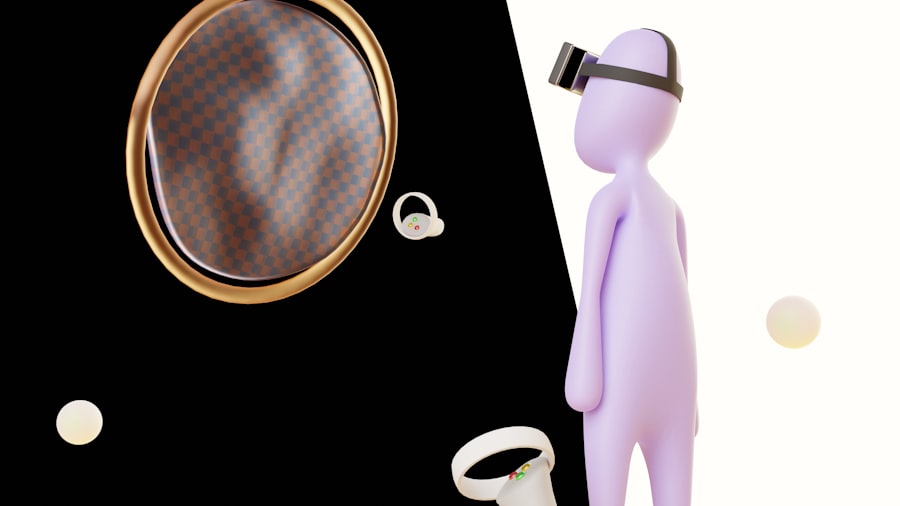Depersonalization is a psychological phenomenon that can leave you feeling detached from your own thoughts, feelings, and sense of self. Imagine looking at yourself in a mirror but feeling as though the reflection staring back is not truly you. This disconnection can be unsettling, as if you are observing your life from a distance rather than actively participating in it.
For many, depersonalization can occur during moments of extreme stress or anxiety, serving as a coping mechanism to shield oneself from overwhelming emotions or experiences. This experience can be transient for some, while others may find it becomes a persistent part of their lives. When depersonalization becomes chronic, it can significantly impact your daily functioning and overall well-being.
You might feel as though you are living in a dream or that your body is not your own. Understanding depersonalization is crucial for recognizing its effects and seeking appropriate support.
Key Takeaways
- Depersonalization is a mental health condition characterized by feeling detached from oneself or one’s surroundings.
- Symptoms of depersonalization include feeling like an outside observer of one’s thoughts or body, emotional numbness, and a distorted sense of time.
- Dissociation is a mental process of disconnecting from one’s thoughts, feelings, memories, or sense of identity.
- The impact of dissociation on daily life can lead to difficulties in relationships, work, and overall functioning.
- Derealization is a related condition to depersonalization, characterized by feeling detached from one’s surroundings and experiencing a sense of unreality.
The Symptoms of Depersonalization
The symptoms of depersonalization can vary widely from person to person, but they often include feelings of unreality, emotional numbness, and a distorted sense of time. You may find yourself questioning your identity or feeling as if you are watching your life unfold from an outside perspective. This can lead to confusion and anxiety, as you grapple with the unsettling nature of these experiences.
In addition to these core symptoms, you might also experience physical sensations such as tingling or numbness in your limbs. These sensations can further exacerbate feelings of disconnection and alienation. It’s important to recognize that these symptoms are not indicative of a personal failing; rather, they are manifestations of a complex psychological response to stress or trauma.
Acknowledging these symptoms is the first step toward understanding and managing them effectively.
Understanding Dissociation

Dissociation is a broader term that encompasses various experiences of disconnection from reality, including depersonalization. It can manifest in different ways, such as memory lapses, feelings of detachment from one’s surroundings, or even a complete disconnection from one’s identity. When you dissociate, it may feel as though you are stepping outside of yourself, observing your thoughts and actions without truly engaging with them.
This phenomenon often serves as a protective mechanism during times of extreme stress or trauma. Your mind may create a barrier between you and the distressing experience, allowing you to cope with overwhelming emotions. However, while dissociation can provide temporary relief, it can also lead to difficulties in processing emotions and experiences in the long run.
Understanding the nature of dissociation is essential for recognizing its impact on your mental health and seeking appropriate support.
The Impact of Dissociation on Daily Life
| Impact of Dissociation on Daily Life | Metrics |
|---|---|
| Difficulty in concentration | High |
| Memory problems | Medium |
| Feeling disconnected from surroundings | High |
| Struggle with daily tasks | High |
| Impact on relationships | Medium |
Dissociation can significantly affect your daily life, making it challenging to engage fully with your surroundings and relationships. You may find it difficult to concentrate on tasks or maintain focus during conversations, leading to feelings of frustration and isolation. This disconnection can create barriers in your personal and professional life, as you struggle to connect with others or fulfill responsibilities.
Moreover, the emotional toll of dissociation can be profound. You might experience feelings of loneliness or sadness as you navigate through life without a sense of connection to yourself or those around you. This emotional distance can lead to further complications, such as anxiety or depression, creating a cycle that can be difficult to break.
Recognizing the impact of dissociation on your daily life is crucial for taking steps toward healing and regaining a sense of agency.
Derealization: What is it?
Derealization is closely related to depersonalization but focuses more on the perception of the external world rather than the self. When experiencing derealization, you may feel as though your surroundings are unreal or distorted. Objects may appear flat or lifeless, and familiar places may seem foreign or strange.
This altered perception can create a sense of confusion and fear, as you grapple with the unsettling nature of your reality. Like depersonalization, derealization can occur during periods of intense stress or anxiety. It serves as a coping mechanism that allows your mind to distance itself from overwhelming stimuli.
However, when these experiences become chronic, they can lead to significant distress and impact your ability to navigate daily life effectively. Understanding derealization is essential for recognizing its effects and seeking appropriate support.
Recognizing the Signs of Derealization

Recognizing the signs of derealization is crucial for understanding your experiences and seeking help when needed. Common signs include feelings of detachment from your environment, a sense that things are not real or are dreamlike, and difficulty concentrating on your surroundings. You may also notice changes in how you perceive time or space, leading to feelings of disorientation.
It’s important to note that derealization can occur alongside other mental health conditions, such as anxiety disorders or PTSD. If you find yourself frequently experiencing these symptoms, it may be beneficial to reflect on any underlying stressors or triggers in your life. Acknowledging these signs is the first step toward understanding your experiences and seeking appropriate support.
The Relationship Between Depersonalization and Derealization
Depersonalization and derealization are often intertwined experiences that fall under the umbrella of dissociation. While depersonalization focuses on feelings of detachment from oneself, derealization centers on the perception of the external world. Both experiences can occur simultaneously or independently, depending on individual circumstances and triggers.
Understanding the relationship between these two phenomena is essential for recognizing their impact on your mental health. You may find that periods of intense stress or anxiety trigger both depersonalization and derealization, creating a cycle of disconnection that can be challenging to break. By acknowledging this relationship, you can better understand your experiences and seek appropriate support.
Coping Strategies for Depersonalization and Derealization
Coping with depersonalization and derealization requires a multifaceted approach that addresses both the psychological and emotional aspects of these experiences. One effective strategy is grounding techniques, which help anchor you in the present moment. This could involve focusing on your breath, engaging in mindfulness exercises, or using sensory experiences—such as holding an object with texture—to reconnect with reality.
Another helpful strategy is journaling about your experiences. Writing down your thoughts and feelings can provide clarity and help you process what you’re going through. Additionally, engaging in physical activities such as yoga or exercise can help release pent-up energy and reduce anxiety levels.
Finding healthy outlets for stress is crucial for managing depersonalization and derealization effectively.
Seeking Professional Help for Depersonalization, Dissociation, and Derealization
If you find that depersonalization or derealization significantly impacts your daily life, seeking professional help is an important step toward healing. Mental health professionals can provide valuable insights into your experiences and offer tailored treatment options that address your specific needs. Therapy modalities such as cognitive-behavioral therapy (CBT) have been shown to be effective in treating dissociative symptoms.
In addition to therapy, medication may also be an option for some individuals experiencing severe symptoms. A mental health professional can help determine the best course of action based on your unique situation. Remember that seeking help is not a sign of weakness; rather, it demonstrates strength and a commitment to improving your mental health.
How to Support Someone with Depersonalization, Dissociation, and Derealization
Supporting someone who is experiencing depersonalization, dissociation, or derealization requires empathy and understanding. It’s essential to create a safe space where they feel comfortable sharing their experiences without fear of judgment. Listening actively and validating their feelings can go a long way in helping them feel understood.
Encouraging them to seek professional help is also crucial. You might offer to accompany them to appointments or help them research therapists who specialize in dissociative disorders. Additionally, being patient and understanding during difficult moments can provide much-needed reassurance as they navigate their experiences.
The Importance of Self-Care in Managing Depersonalization, Dissociation, and Derealization
Self-care plays a vital role in managing depersonalization, dissociation, and derealization effectively.
Prioritizing self-care allows you to cultivate resilience against stressors that may trigger dissociative symptoms.
Establishing a routine that incorporates self-care practices can also provide structure and stability in your life. This routine might include regular exercise, healthy eating habits, and sufficient sleep—all essential components for maintaining mental health. By prioritizing self-care, you empower yourself to navigate the challenges associated with depersonalization and dissociation more effectively.
In conclusion, understanding depersonalization and its related phenomena—dissociation and derealization—can provide valuable insights into your experiences and those of others around you. By recognizing symptoms, seeking professional help when needed, employing coping strategies, supporting loved ones, and prioritizing self-care, you can take meaningful steps toward managing these complex psychological experiences effectively.
In exploring the complex phenomena of depersonalization, dissociation, and derealization, it’s essential to delve into the psychological underpinnings and therapeutic approaches that can aid individuals experiencing these conditions. An insightful article on this topic can be found on Unplugged Psych, which provides a comprehensive overview of these dissociative experiences and their impact on mental health. For a deeper understanding, you can read more about these conditions and their treatment options by visiting this article on Unplugged Psych. This resource offers valuable information for both mental health professionals and those seeking to understand their own experiences with dissociation.
LEARN MORE About Unmasking the Mysteries Behind Depersonalization and Derealization
FAQs
What is depersonalization?
Depersonalization is a mental health condition characterized by feeling detached from one’s own thoughts, feelings, and body. It can make individuals feel like they are observing themselves from outside their own body.
What is dissociation?
Dissociation is a mental process where a person disconnects from their thoughts, feelings, memories, or sense of identity. It is often a coping mechanism for dealing with trauma or overwhelming stress.
What is derealization?
Derealization is a mental health condition where a person feels like the world around them is unreal or distorted. It can make the environment seem foggy, dreamlike, or artificial.
What are the causes of depersonalization, dissociation, and derealization?
These conditions can be caused by various factors, including trauma, stress, anxiety, depression, substance abuse, and certain mental health disorders.
What are the symptoms of depersonalization, dissociation, and derealization?
Symptoms may include feeling disconnected from oneself or the world, experiencing a sense of unreality, having difficulty connecting with emotions, and feeling like one’s body or surroundings are distorted.
How are depersonalization, dissociation, and derealization treated?
Treatment may involve therapy, medication, stress management techniques, and addressing any underlying mental health conditions. It is important to seek professional help for an accurate diagnosis and appropriate treatment plan.




